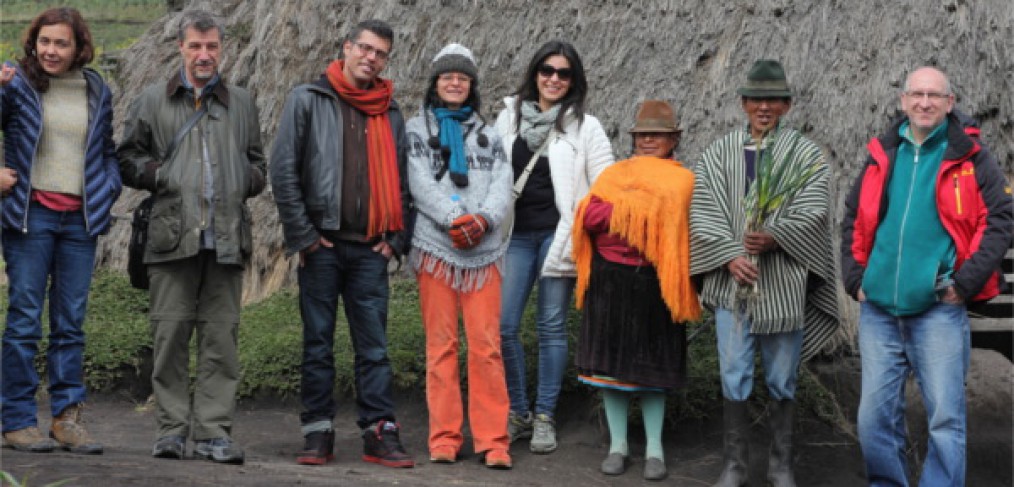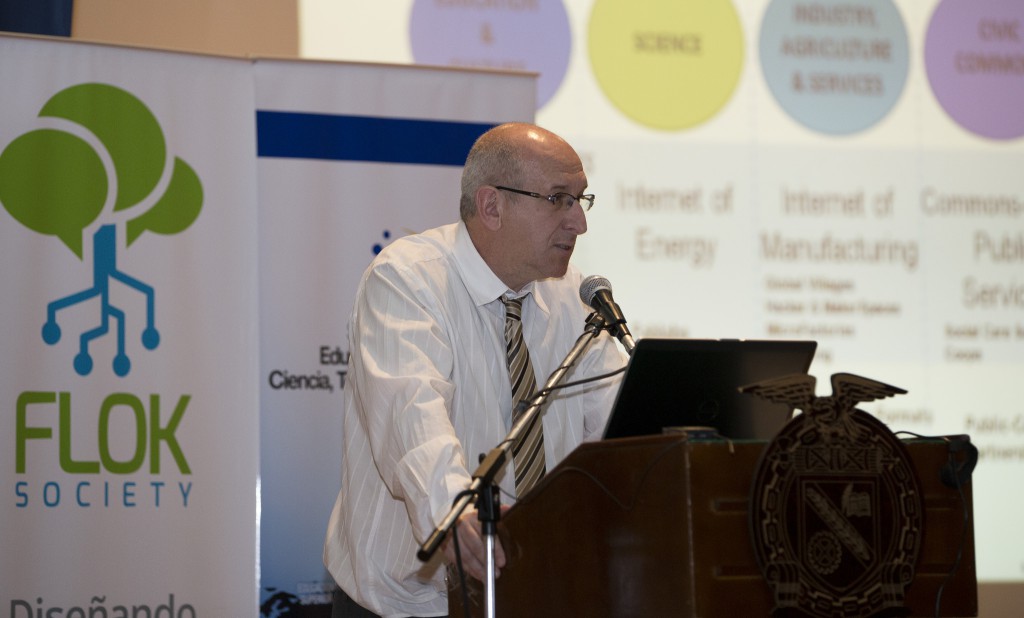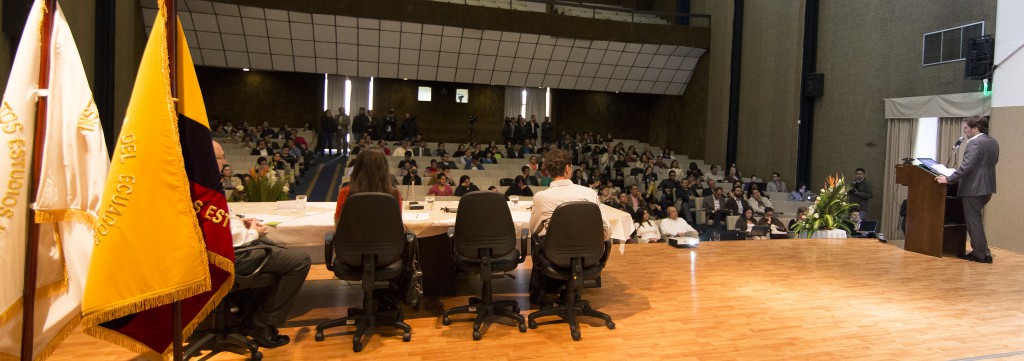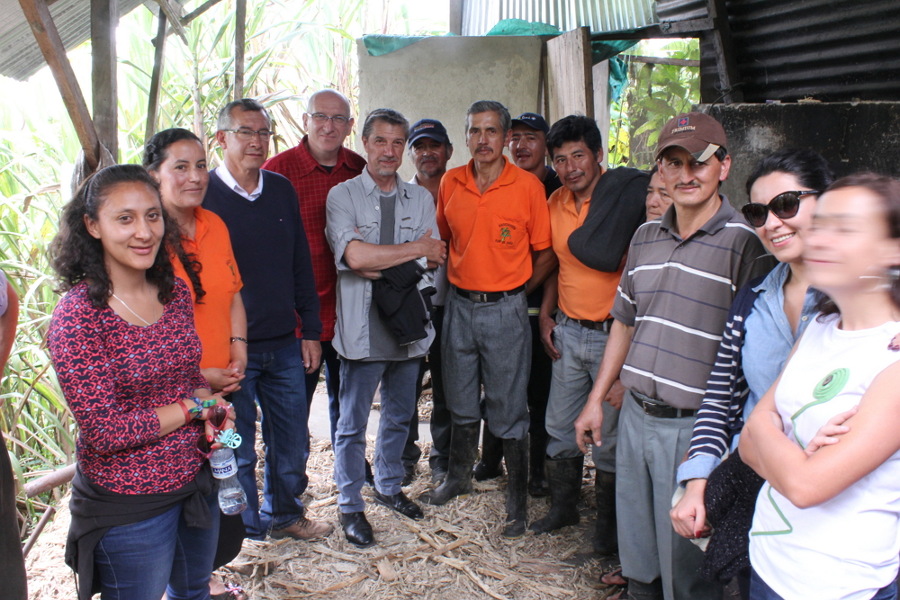
A new evaluation of the FLOK experience in Ecuador: what’s next?
Michel Bauwens
At the end of 2013, three governmental institutions asked a team of researchers to draw up a participatory process in order to craft a transition strategy for a society based on ‘free, libre and open knowledge’. The project was of course rooted in particular local concerns, but also transcended this local situation.
The local context was the following: Ecuador is still essentially in a dependent situation vis a vis the western-dominated global economy, which means that it needs to export raw material at low added value, and import consumer goods at high added value. It’s a scenario for permanent dependency that the progressive government wanted to change. Following the lead of Minister René Ramirez of the SENESCYT innovation agency, the project aimed to envisage an economy that would no longer be dependent on limited material resources, but on infinite immaterial resources. The proposals of the research team consisted of a generic Commons Transition Plan, and 18+ legislative proposals including a dozen pilot projects, which were validated in the Buen Conocer Summit at the end of May 2014. The synthetic proposals were then presented by the research team at the end of June 2014, while still being finessed for scientific publication. The proposals are now being processed in the Ecuadorian administration, subject to local politics.
Several aspects of the Ecuadorian process were highly innovative, such as the intense participatory process, and the openness to both local and foreign input, which is quite unusual.
But the Flok project and the Commons Transition Plan also significantly transcend the local context and have a global significance.
The first characteristic of the process is of course its very existence. This is the first time that a transition plan to a commons-based society and economy was crafted. There are ‘new economy’, climate change-centric, green, and other transition plans, but none of them focused on re-organizing society and the economy are the central concept of the Commons as the core value creation and distribution system. Although there are “new economy”, climate change-centric, green, and other transition plans, none of these focus on societal and economic re-organization, which are the central concepts of the Commons as the core value creation and distribution system.
The Commons Transition Plan is based on an analysis and observation of already existing commons processes and economies, and the value crisis that they provoke within the current political economy.
There is indeed a increasing contradiction between new relations of production emerging around the digital commons and the economies they are creating, and how this emerging prototype of a new mode of production is embedded within capitalism. In short, while more and more use value is created in and through the commons, only a fraction of this is being monetized. This monetization is being achieved through proprietary platforms that very seldom share any of this exchange value with the creators of value.
Hence we see an evolution from a cognitive capitalism based on rent extraction through intellectual property and domination and control of supply networks, to a new form of ‘netarchical capitalism’ in which proprietary platforms both enable human cooperation but also extract value from it. In other words, netarchical capitalism directly extracts value from human cooperation itself. But its failure to return that value has created both increased precarity as well as a crisis of capital accumulation Any transition must also solve and restore the feedback loop between value creation and distribution, and create an ethical and civic economy around the Commons, moving from extractive to generative forms of capital. Capital that returns value to those that contribute to the commons.
The Commons transition plan is based on a simultaneous transition of civil society, the market and the state forms.
For much of the history of industrial and post-industrial capitalism, political conflict has been between state and market: either to use state mechanisms for the regulation and redistribution of the excesses of market players, or, conversely, to re-privatise activities towards market players. This has been called by some the lib (for liberal) vs lab (for labour and its derivative social movements) pendulum. In our current political economy, with the exception of researchers who operate outside the mainstream (such as Elinor Ostrom and her research on the Commons), the latter has been discarded as a historical legacy without future. Indeed, the remaining physical commons that exist globally, mostly in the South, are everywhere under threat.
But the re-emergence of digital commons of knowledge, software and design do not only recreate commons-oriented modes of production and market activities around it.It also shows that value is now created through contributions, not labor per se, and creates commons, not commodities. Through its contributions, it can be said that civil society has now become productive in its own right, and we can make a leap from contributor communities to a vision of civil society that consists of commons contributed to by citizens. The entrepreneurial coalitions created around the commons should necessarily be in alignment with the commons, induce the vision of an ethical economy, a non-capitalist marketplace that integrates externalities, and re-introduces reciprocity in the market’s functioning while co-creating commons and creating livelihoods for the commoners. Finally, the emergence of FLOSS Foundations in the commons economy, organizations that maintain the flow of cooperation through the maintenance of its infrastructures, point the way toward a new state form, which we have called the Partner State.
Thus, the commons not only introduces a third term beside the state and the market, i.e. the productive commons-producing civil society, but also a new market and a new state. These changes must happen concurrently in all three aspects of our social and economic life.
Let us repeat:
- In the old vision of value creation in industrial capitalism, value is created by private actors, labor and capital; it is captured by enterprise, which pays the workers; but, since private market players do not take into account the negative social and environmental externalities of their mutual exchange, an external institution is needed as an external regulator, i.e. the state. Civil society has no clear and recognized role in such societies, as even the vocabulary of ‘non-profits’ or ‘non-governmental’ indicates. Civil society is at most a rest category, which can mediate some political processes.
- In the new vision, value is created by contributors, paid or unpaid, to the common good as expressed in shareable commons; in this scenario, civil society has become productive, it is the core of value creation; around the abundant commons, which are not market goods, added value can be created for the market place; and, if we do not want the value of the commons to be exclusively captured by non-inclusive extractive forms of capital, it needs an ethical economy, i.e. entrepreneurial coalitions that are aligned to the commons through which they create economies and livelihoods.
What then,is specific about our notion of the ‘ethical economy’?
We call the existing economy an extractive economy, because it extracts capital from the commons, but does not directly create livelihoods for the commoners; what is needed is generative capital, that generates capital and livelihoods for the further production of the commons. Thus we imagine a connected binary of the commons sphere, in which contributors jointly create commons, AND a cooperative sphere, in which commoners act as cooperators, generating their own livelihood and ‘cooperative accumulation’ of capital, which funds the continued production of commons, without extracting its value to maximise the profit of shareholders. One of the techniques we propose to do this is a new type of license, the ‘copyfair’ license or license for reinforced reciprocity. Classic free licenses, such as the copyleft licenses, allow for generalized sharing and use, including by huge multinational corporations which end up dominating the commons economy.
The Commons-Based Reciprocity license, a hypothetical to be created license that is prefigured in the Peer Production License developed by Dmytri Kleiner, introduces the following rules:
- all common good institutions, which are structurally aligned through the common good or a social goal through their internal statutes, can use the particular commons covered by the license
- all non-commercial entities and activities, can use that commons
- all for-profit companies who contribute to the commons can use that commons
The license introduces one major new restriction, i.e. for-profit entities which want to use that commons without contributing to it, are required to pay a moderate license fee.
The main aim however, is not to capture this new flow of income or capital for the commons, but most of all it is to re-introduce the concept of reciprocity in the marketplace. Hence, we see this as an essentially non-capitalist market, since instead of enclosing the commons, or exclusively capturing its value for profit maximisation, it is a market which actually generates capital for the commons. Hence we move from a condition of ‘communism of capital’, in which capital uses the commons, to a condition of ‘capital for the commons’, in which the new form of capital strengthens the commons and the commoners.
We further propose a second innovation for the ethical entrepreneurial coalition surrounding the commons, i.e. a new corporate format, that of ‘open cooperatives’. A classic cooperative consists of members, producers or consumers, which co-own and co-govern the cooperative under the principle one member, one vote. In order to survive in the capitalist marketplace, cooperatives tend over time to use the same strategies as corporations, work for their own members exclusively, and increasingly use internal structures that resemble capitalist enterprise. Generally, they do not produce commons. Hence we believe that we need a new type of cooperative structures, which we call ‘open cooperatives’.
The characteristics of the open coops are the following:
- the cooperative internal statutes are oriented towards the common good
- the cooperative has a multistakeholder governance and ownership model
(cooperatives with these two characteristics already exist, and are called ‘solidarity cooperatives’; they are a general model for social care provision in the Italian province of Emilia-Romagna, and in Quebec)
But the following two characteristics do not generally exist yet, except in prefigurative and insufficient forms:
- the cooperative must actively co-produce commons
- the cooperative must be organized around its global commons on a global organizational level
Currently, cooperatives produce revenues and benefits for their members, but do not produce commons. An open cooperative uses open and free licenses, and as we suggest, the CopyFair type of licenses, to insure an ongoing production of immaterial commons, that can be used for all. Open cooperatives can also produce physical commons. For example, the Alianza Solidaria housing coop in South Quito, Ecuador, asks it member to contribute one hundred hours of community work, which is used to clean the ravines around the housing estate, and which are then given back as publicly accessible parks to all citizens, hence functioning as a commons. We of course also need to rethink the expansion of commons formats to physical and financial capital. An ethical economy is not a liberal economy which assumes that the universal selfishness at the basis of market transactions, automatically create wealth; instead, it structurally integrates the creation of positive externalities for the commons, as an integral part of its productive activity.
Why must a open cooperative also be organized on a global level ?
The current organizational model of peer production communities, i.e. communities that share knowledge, code or design, consists of three levels:
- the open design communities themselves, consisting of contributors, paid of unpaid that allocate their resources to the particular commons ; these communities are naturally global, open to all who can access the networks
- a for-benefit association or foundation, which manages or enables the infrastructure of cooperation; for example the FLOSS Foundations insure that open source communities can continue to do their work over time, through the protection of the commons through licences, certification programs, the organisation of conferences, and the like. Though these foundations may be legally anchored in a single country, they are also mostly global organizations
- finally, there are the entrepreneurial coalitions who create value on top of the commons, for the marketplace.
Most of these entrepreneurs are for-profit and may may be organized as ‘multinationals’ at the global level, such as IBM within Linux.
However, the distinct mode of production that such networks enable follow the rule: “if it is light, it’s global, if it is heavy it is local’.
If we believe in the creation of an open and free economy based on distributed local production, i.e. through microfactories, it would be very natural to create local producer cooperatives in charge of making and selling that particular production. It is here that the imbalance would be created: while the for-profit economy and its accumulation of capital and power is able to project itself globally and threatens and diminishes the power of nation-states for private gain, the alternative cooperative economy on the other hand, would remain local, and would be unable to project such counter-power.
Hence the proposal for ‘global open cooperatives’, either as single organisational entities or as federations of local producers. Las Indias, a cooperative active in various parts of Spain and the hispanic world, argues for the creation of “phyles’. A phyle is a global business eco-system that creates livelihoods for communities and their commons. It is this form of organization that we advocate as well. One of the projects that goes in that direction is the fair.coop initiative of the Catalan Integral Cooperative. FairCoop is starting as a network of fair trade cooperatives, most especially active in the Global South, which would start using the FairFoin crypto currency, a fork of Bitcoin that would use the rent extracting mechanisms of Bitcoin, which favours the enrichment of early adopters, but would gift them as a capital good to these cooperatives.
The report also specifically innovates the concept of the state, and through the partner state concept, proposes the creation and use of public-commons partnerships, and the commonification of public services, and other innovative concepts and practices that could fundamentally renew our political economy.
The concept of the state is derived from the emergence of the for-benefit FLOSS Foundations in the micro-economy, as key new institutions created by the peer production communities. Just as these foundations enable and empower the cooperation to take place, so would a partner state, at the macro level, enable and empower the individual and collective economy of citizens, as producers of value and contributors to the common good. A partner state is not a market state which favours market forces, but a democratic and participatory collective institution, or set of institutions, that enables social production and an autonomous civil society with a thriving ethical economy. The commonification of public services means that the state insures equal and equitable access to key public services, but that these public services themselves are a co-production and co-governance of the citizenry and related user communities. A model of this are the solidarity cooperatives for social care, already active in Quebec and northern Italy (Emilia-Romagna). Public-commons partnerships would be the result of this process and would be an alternative to public-private partnerships, which often socialize the losses and privatize the gains, while being detrimental to the universal access to the provisioning of what should be public services.
What now? What comes after the experience in Ecuador?
First of all, through a new website and wiki at commonstransition.net, the P2P Foundation and its partners are making an effort to create an open public forum for further commons-driven and commons-oriented policy-making, that is distinct from its first iteration in Ecuador (floksociety.org), and is open to all contributions from commoners globally.
With the Commons Transition Plan as a comparative document, a ‘force de proposition’ as they say in French, we intend to organize workshops and dialogues to see how other commons locales, countries, language-communities but also cities and regions, can translate their experiences, needs and demands into policy proposals. The Plan is not an imposition, but something that is intended as a stimulus for discussion and independent crafting of more specific commons-oriented policy proposals in various specialized contexts. As part of this process, we have already concluded a workshop with the Reseau Francophone des Communs in Paris in September, and workshops with Syriza officials in Greece. The idea is not to support or choose any political or social movement, but to enable all progressive and emancipatory forces to look for commonalities around their approaches, and renew their political visions with the commons in mind.
This project therefore, is itself a commons, open to all contributions, and which should benefit all who need it.
In the Commons Transition Plan, we are making also very specific organizational proposals, to advance the cause of a commons-oriented politics and a ‘peer production of politics and policy’.
At the local level, we propose the creation of Assemblies of the Commons, institutions that bring together all those that are creating or maintaining commons, immaterial or material, but we propose to restrict membership to civic organizations and not-for-profit oriented projects.
At the same time, we propose the creation of local Chamber of the Commons, the equivalent for the ethical economy and ‘generative’ capital, the what the Chamber of Commerce is for the for-profit economy. Our aim is to reconstruct commons-oriented social forces at the local level, and to give them voice. These assemblies and chambers could produce a social charter, that would be open for political and social forces to support, which in turn would guarantee some forms of support from these new institutions.
At the larger regional but especially national levels, but also perhaps at the global level, we propose to re-organize politics around the joint value of the commons. Such a (global) ‘coalition of the commons’ would create alliances of those movements that express the digital commons and digital cultures (such as Pirate Parties and internet platform parties), the ecological forces who are naturally inclined to environmental commons, the new transformative parties of the left such as Podemos and Syriza, who may be called the forces of the industrial commons, and the expressions of progressive entrepreneurs, i.e. the ethical coalitions that emerge around the commons, of which Alternativet in Denmark may perhaps be an early expression. Such coalitions would support politics and policies which are no longer a prisoner of the lib/lab dilemma, i.e. nationalisation vs privatisation, but can rethink social organization as a triarchy based on the commons.
It is important to keep in mind the limitations of the first Commons Transition Plan. Indeed, the remit of the FLOK project in Ecuador, was the implementation of a ‘social knowledge economy’, i.e. an economy that is centered around knowledge commons. Therefore, this plan did not include a transformation strategy for other commons, such as the Polanyi triangle of land and nature, labour, and money. We partly went beyond this limitation by putting a lot of attention to the material and immaterial conditions, and feeding mechanisms, which would guarantee the successful existence of the immaterial commons of knowledge, however, that is not sufficient.
Thus, the Commons Transition Plan is waiting for its next iteration, in which the knowledge commons are not the only commons to be considered a priority, but would be rather seen as a more general, fully physical, transformation towards a commons economy based on the commonification of land, money and labor as well.
Images by Kevin Flanagan and FLOK Society




